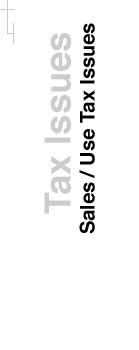 | Computer Hardware & Software |  | ||||||
| home » sales/use tax issues » computer hw & sw » | ||||||||
 |
Definitions and Taxation in General: As is the case with most new technologies, law and taxation have had difficulty keeping up with changes in the field. It is safe to say, however, that the learning curve is quickly decreasing and more companies are finding unwelcome audit notices in the their mail. What's more disturbing though is that very few technology companies truly understand state tax statutes or the potential pitfalls they face during an audit. Knowledge and understanding of terms used and general application of taxing rules must be clearly defined for each state where you do business. Hardware: Hardware is the physical computer assembly and peripherals, including but not limited to such items as the central processing unit, keyboards, consoles, monitors, memory, disk and tape drivers, terminals, printers, plotters, modems, tape readers, document sorters, optical readers and digitizers. Computer means a programmable machine or device having information processing capabilities and includes word processing equipment, testing equipment, and programmable microprocessors and any other integrated circuit embedded in manufactured machinery or equipment. The internalized instruction code which controls the basic operations (i.e., arithmetic and logic) of the computer, causing it to execute instructions contained in system programs, is an integral part of the computer. It is not normally accessible or modifiable by the user. Such integral code systems are considered part of the hardware. The retail sale of computer hardware would then be subject to the taxing statutes which include the exchange of tangible personal property. However, machinery or equipment used directly in manufacturing, processing, fabricating, and job printing are classified as tax exempt under certain states code (see our discussion of Manufacturing on this web site). How the computer hardware is being used must be considered to correctly classify it as taxable or tax exempt under each specific state's code. Software: Computer software is defined as sequences of instructions or collections of data which, when incorporated into a machine-usable processing storage or communication medium or devices such as printed material, cards, disks, tapes, modems, or memory, is capable of causing a computer to indicate, perform, or achieve a particular function, task, or result. Computer software includes instructions and data, including any documentation or information held on storage media. The requirement that there be a transfer of title or possession is important for the computer industry. For example, most computer software is not "sold" or "leased" in the traditional sense of the word. Theoretically, computer software is licensed to the end user. Nevertheless, there is still a transfer of possession of the program for consideration, and hence still considered to be a sale in most states. Canned software: The transfer of title, possession, or use for a consideration of any computer software which may be transferred to a customer electronically or in the form of punched cards, magnetic tape, other storage media, or by listing the program instructions on coding sheets is considered a transfer of tangible personal property in many states. Canned is "prewritten" computer software which is offered for sale, lease, or use to customers on an off-the-shelf basis, with little or no modification at the time of the transaction beyond specifying the parameters needed to make the program run. Evidence of canned software includes the selling, licensing, or leasing of the identical software more than once. Custom software: The transfer of title, possession, or use for a consideration of any computer software created specifically for one user and prepared to the special order of that user which may be transferred to a customer electronically or in the form of punched cards, magnetic tape, other storage media, or by listing the program instructions on coding sheets is considered a transfer of tangible personal property in most state's statutes. However, the key factor that comes into consideration when determining the taxability status is "created specifically for one user and prepared to the special order of that user". Single use usually makes the custom software purchase exempt because it is considered a purchase of professional services rather than tangible personal property. Each state has had to define tangible personal property in relation to custom software and specifically include or exclude its taxability. Other issues that can become "taxing":
Feel free to call or e-mail us to discuss any tax issues you may have.
| |||||||
| Last modified on Sat Oct 18 2014 23:40:19 UTC. | ||||||||
| 15 July 2025 | About Legal Privacy Contact Accounting Policies & Procedures Corporate | top | © 2025 | |||||